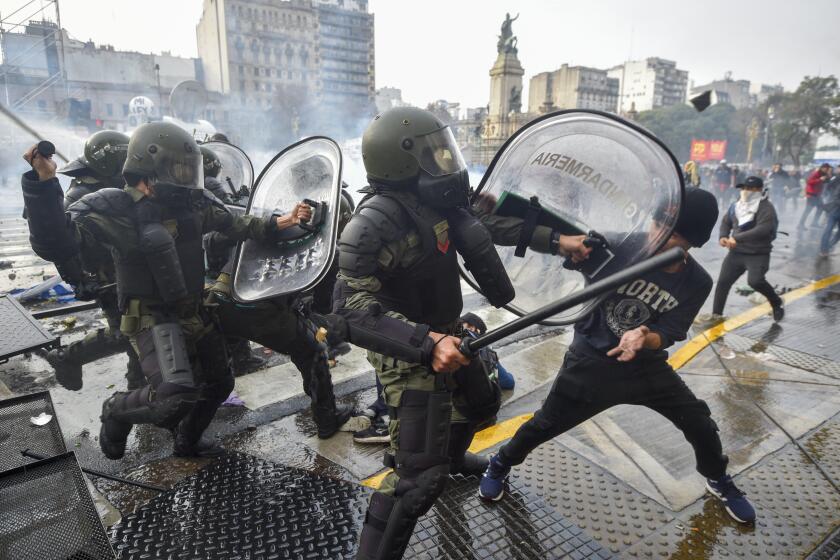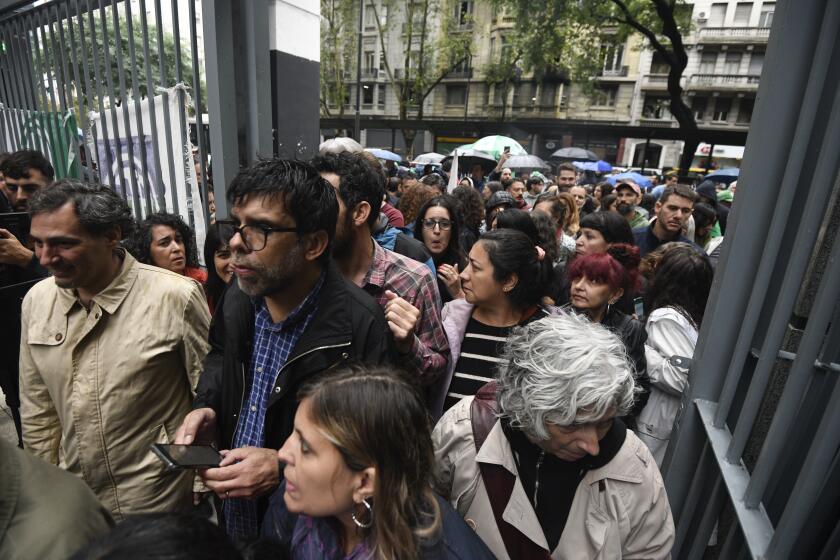Milei’s radical overhaul passes Argentina’s Senate after protesters clash with police

- Share via
BUENOS AIRES, Argentina — Argentina’s Senate narrowly approved President Javier Milei’s sweeping proposals to slash state spending and boost his own powers on Thursday, handing the libertarian leader a much-needed first legislative victory.
Milei hailed the vote as a “triumph” even as opposition senators scrapped an income tax package and tweaked some contentious elements after an hourslong debate marred by violent clashes between police and protesters in downtown Buenos Aires.
Senate president Victoria Villarruel, the vice president, used a tiebreaking vote to give provisional approval to Milei’s plans to trim the fiscal deficit, incentivize foreign investment and privatize some state-owned companies in a bid to transform the bloated Argentine state and overhaul its long-troubled economy.
The most critical parts of Milei’s legislation went on to pass a marathon article-by-article voting session that stretched into Thursday morning.
His party made some tough concessions, agreeing not to sell off Argentina’s flagship airline Aerolíneas Argentinas, post office or public media company, leaving just a handful of state-owned firms, such as Argentina’s nuclear power company, on the block for possible privatization. A measure lowering the income tax threshold to include thousands more workers also failed to pass the second round of Senate voting, complicating Milei’s fiscal consolidation plans.
Thousands of demonstrators had converged around Congress as Senate opened debate on the key tax and economic austerity legislation.
The Senate’s changes to the state overhaul bill now face a final vote in the lower house. But after months of legislative pushback, it’s likely that the version approved by senators will become law.
As senators clashed over the bill inside Congress on Wednesday, thousands of protesters poured into the streets outside, burning cars and throwing Molotov cocktails as hundreds of federal security forces pushed back with rounds of tear gas and water cannons.
The passage gave a major boost to Milei, a populist outsider who rode to power stridently attacking the establishment but has found it impossible to enact deep reforms without making compromises in Argentina’s opposition-dominated Congress. Milei’s three-year-old party, Liberty Advances, holds just 15% of seats in the lower house and 10% of the Senate.
“Tonight is a triumph for the Argentine people and the first step toward the recovery of our greatness,” Milei posted on X, formerly Twitter, calling his bills “the most ambitious legislative reform of the last 40 years.”
Argentina says that it had cut 15,000 state jobs as part of President Javier Milei’s aggressive campaign to slash spending.
As the sole leader since Argentina’s return to democracy in 1983 not to pass a law within his first six months as president, Milei has struggled to break the legislative impasse that has raised doubts about his governability and unnerved investors otherwise enthused by his libertarian agenda.
Analysts said the bill’s advance was enough, at least in the short term, to reassure jittery markets that Milei’s agenda has enough supporters to survive Argentina’s mounting political chaos and social unrest. Argentina sovereign bond yields jumped on news of the approval Thursday.
But the opposition has vowed to keep fighting and the plans passed with a razor-thin majority remain riddled with uncertainties.
“The Milei government showed it’s in a political learning curve, which is positive for investors and markets whose main concern is how much of his reform promises will materialize,” said Marcelo J. García, Americas director at geopolitical risk firm Horizon Engage. “But he’ll need to engage in issue-by-issue dialogue to implement at least part of his reform agenda.”
For nearly 21 hours, lawmakers haggled over the 238-article state reform bill, unpicking some parts but passing Milei’s highly divisive declaration of a one-year state of emergency and delegation of broad powers to the president in energy, pensions, security and other matters until the end of his term in 2027.
Argentina’s biggest trade unions have mounted one of their fiercest challenges to the libertarian government of President Javier Milei.
In a reflection of the governing party’s weakness, Villarruel again used a casting vote to approve Milei’s expanded powers after a 35-35 tie.
Other articles seen as controversial that passed include an incentive scheme that would give investors lucrative tax breaks for 30 years.
His vision marks a stark reversal from that of the left-leaning Peronist movement, aligned with former leftist president Cristina Fernández de Kirchner, which has run vast budget deficits financed by printing money for much of the last two decades.
The spending cuts and currency devaluation that Milei has delivered have, at least in the short term, hit the populace hard — exacerbating a recession, increasing poverty to 55% and driving annual inflation toward 300%, among the highest in the world.
The pain has tested the patience of ordinary Argentines still waiting to see the promised benefits of his reforms, including stable currency, tamer inflation and fresh foreign investment.
Debre writes for the Associated Press.
More to Read
Sign up for Essential California
The most important California stories and recommendations in your inbox every morning.
You may occasionally receive promotional content from the Los Angeles Times.













